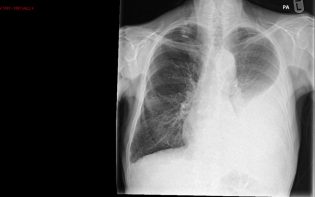Pleural effusion (Fluid in the pleural space)
What is pleural effusion?
— Pleural effusion is a build up of fluid around (but not inside) the lungs. Heart failure is the most common cause of this problem. Pleural effusion can also be caused by an infection, cancer, or other health problems.
What are the symptoms of pleural effusion?
— The symptoms include:
- Chest pain – This pain can be sharp and get worse when you cough or take a deep breath. Sometimes the pain is a dull ache.
- Breathing problems – You might breathe faster than normal or feel short of breath.
- Cough
- Fever
- Hiccups
Will I need tests for pleural effusion?
— Yes. Tests for pleural effusion include:
- An X-ray of your chest
- A CT scan of your chest – This is a special type of X-ray.
- Ultrasound – This test uses sound waves to take pictures of the fluid around your lungs. Your doctor might do this test if you need to have some fluid taken out.
- Thoracentesis – This is the name for a test in which a doctor takes a sample of fluid from around your lung. This is done using a needle that goes through the skin on your chest. Another doctor then checks the sample under a microscope.
How is pleural effusion treated?
— The treatment depends on your symptoms and the cause of the problem. If you are having trouble breathing, your doctor will remove the fluid from around your lungs with a needle or plastic tube.
If heart failure caused the fluid around your lungs, your doctor will prescribe medicines called “diuretics.” These help pull fluid out of your lungs.
If an infection caused the fluid around your lungs, your doctor will prescribe antibiotics. Your doctor might put a flexible plastic tube into the fluid to drain the infection. This tube might stay in for a few days.
If you have cancer and get fluid around your lungs, your doctor might put a flexible plastic tube in the side of your chest to drain away the extra fluid. Your doctor might leave the tube in for a few weeks and you will drain the fluid at home. You might also need chemotherapy to treat the cancer and prevent the fluid from coming back.
You also might need surgery to remove a small sample of tissue from around your lungs. This is called a “biopsy.” Tests on this tissue can help explain why you have the effusion. At the time of surgery, the doctor might use a powdery substance called “talc” to close the space and keep the fluid from returning.

